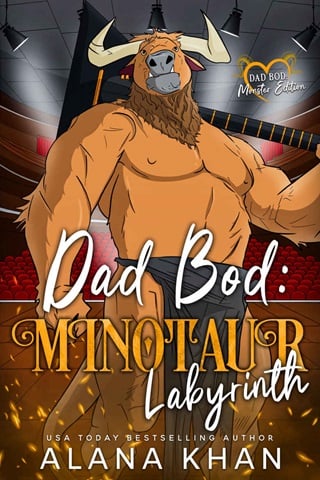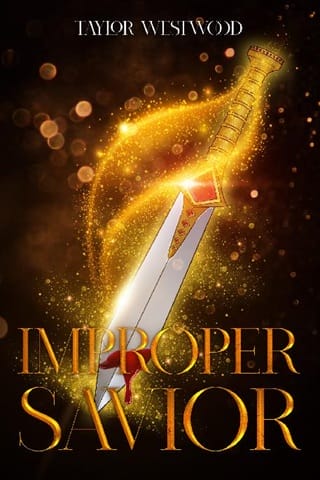Chapter Fourteen
Stephanie
The closer we get to the Integration Zone, the higher my fear spikes. The GPS screen doesn’t even show the streets inside the zone. It’s just a big red square on the map, as though it’s enemy territory or a war zone.
We don’t need GPS anymore, though, because we’re close enough that we can hear the protestors’ chants through the closed car windows.
“Monsters go home!”
“Keep human blood pure!”
“Others don’t belong.”
“I imagine your house in the boonies of Georgia is looking pretty good right now.” I don’t glance at him to see his response; my eyes are focused on the mob that seems to be closing in around us.
“Yeah. Sitting in front of my bank of windows looking at my very empty backyard sounds like heaven.” His tone is clipped, jaw tight. I reach over and squeeze his forearm, hoping he takes it as I mean it—a sign of support.
As he pulls up to the gate, the second car in line, about ten protesters converge on our rental SUV.
“Shit.” His voice is tight.
The gate is a ten- or twelve-foot tall, barbed wire contraption on rollers. I’ve seen similar things at checkpoints in war movies. The gate itself is flanked by a guard shack on either end. Both are manned by uniformed staff. National Guard? Yikes. These people have been here for over twenty-five years and still aren’t free to leave their ghettoized enclave?
The crowd must have seen that a minotaur is driving the car, because they’re banging on the car, starting to rock it.
“I hope you got the insurance upgrade on the rental car.” His attempt at humor is not reassuring. When I tear my gaze from the mob of people, I see the look of anger and desperation on Alfie’s face.
“I shouldn’t have brought you here, Steph. I’ve put you in harm’s way.”
“Who would have thought being in America would feel as though we’re in a third-world country? Shit, shouldn’t those fucking guards do something?” My voice is an octave higher than usual as my panic rises, a lump forming in my throat and my heart hammering against my ribs.
The crowd is no longer chanting singsong slogans. They’ve gone off script and are hurling personal epithets.
“You don’t belong here!”
“Get the fuck out of our country.” That one was accompanied by a bash against my window. A stick? A baseball bat?
“Look! A woman.”
“An Otherfucker!” This is shouted with such vehemence it seems to sink through the car exterior and into my skin.
Alfie lays on the horn, perhaps hoping the guards will notice the crowd is moments away from pulling us out of the car and physically attacking us.
“Get away! Back off!” This is shouted through a bullhorn as four males in riot gear, complete with body armor and plastic face shields, exit the safety of their shacks.
Finally, the guards noticed that any moment now, these crazy people are going to turn our car on its side.
It’s only when they brandish their rifles that the crowd backs away. They don’t disperse, just give us breathing room.
When we pull even with the woman who’s checking documentation at the gate, she doesn’t bother to ask Alfie for anything. I guess that makes sense. He’s an Other. As far as she knows, he was born and raised in the Zone and is probably just returning from work. Instead, she focuses on me.
Her male counterpart has me roll down my window and hand him my driver’s license. As he’s asking me my business, a male minotaur eases closer from inside the gates. He’s wearing cutoff jeans and nothing else. Perhaps Alfie was right. Maybe all minotaurs wear as little clothing as possible.
“They’re here for a meeting,” he says. “Alfie? Stephanie?” he asks, just to make sure.
I’m surprised he remembered my name. Although I did ninety percent of the arrangements, Alfie was in charge of organizing everything with the musicians.
When the gatekeepers realize we’re here for an appointment and mean the inhabitants of the Zone no harm, we’re waved through.
“I’m Bechtel. Pleased to meet you.” He nods and smiles, walking alongside the car as we progress at one mile an hour up the street. “There aren’t many cars in the Zone. Since most Others don’t have jobs outside the fence, few people need them. The Zone’s only about ten square blocks. Why don’t you pull over here and I’ll give you the tour on foot?”
We were invited to breakfast, and afterward, every musician in the Zone will play in a jam session. Bechtel, who plays the guitar and the blenturian flute, thought it would be less stressful for all concerned for Alfie to see everyone play in a casual environment rather than having people audition one by one.
As Alfie pulls over, I scan what I can see of the Zone. Did I think of it as a war zone earlier? That’s exactly what it reminds me of. It’s filled with ancient buildings, crumbling from age, although it’s clear people have painted the fa?ades, tried to keep them up. The streets and sidewalks are clean, and the yards are tidy. Clothing looks worn but clean and neatly mended. They may be poor, but there’s no lack of pride.
From what I read this was a horrific ghetto before the Others fell to Earth. The human inhabitants were moved to better lodging elsewhere, the authorities erected a barbed-wired-topped fence around the entire place, and the Others were shoved here without much planning. That was twenty-six years ago.
People are approaching us with fascination. It’s just what I’d imagined: towering, thick-muscled, green-skinned orcs, sinuous, shimmering-scaled nagas, wolf-like people, and others I have no names for.
Unlike the humans outside the fence who were aggressive and bent on violence, these people treat us with the utmost respect.
“Everyone has heard of you, Mr. Foster—” a female naga calls, a babe clutched close to her chest in a fabric sling.
“Call me Alfie.”
“Labyrinth. It’s like a mantra, a prayer. You’re known as the Other who lives outside the Zone, who commands respect instead of loathing, who is coming here to reach out his hand, to lift more of us up.” This is said by a wizened wolfen, muzzle silver with age.
My eyes get misty, well, more than misty. I’m holding back tears. These people are so downtrodden and need so much.
When I glance at Alfie walking beside me, he doesn’t appear proud, as I expected. He looks overwhelmed. It dawns on me that he’s just a male, a musician who had trouble leaving his house to come here. Bechtel and all these people are expecting a lot from him. How can he possibly deliver?
Because I’m so focused on Alfie, I’m not looking where I’m going and almost sprain my ankle in a pothole. Luckily, Alfie grips my upper arm to keep me from falling. A thrill travels up my spine when he doesn’t let me go and keeps one supportive palm on the small of my back.
Alfie thought he traveled here to help himself. I doubt he realized every male, female, and child in the Zone was hoping he could help their plight. The question is, how can he live up to those impossible expectations?
 Fullepub
Fullepub 



